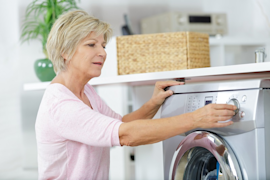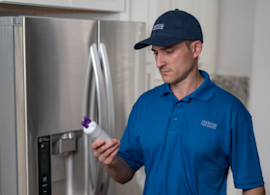- Kenmore refrigerator water filters
- Whirlpool refrigerator water filters
- Samsung refrigerator water filters
- GE refrigerator water filters
- LG refrigerator water filters
- Frigidaire refrigerator water filters
- KitchenAid refrigerator water filters
- Maytag refrigerator water filters
- Kenmore Elite refrigerator water filters
- Estate refrigerator water filters
- GE Profile refrigerator water filters
- Amana refrigerator water filters
- Bosch refrigerator water filters
- Dacor refrigerator water filters
- Electrolux refrigerator water filters
Kenmore 417 model front-load washer error codes

These error code explanations can help you diagnose a problem with your Kenmore front-load washer with a model number that starts with 417. For repair how-to help, visit the PartsDirect repair help section, which includes repair help for washing machines, other major appliances, lawn and garden equipment, garage door openers, vacuum cleaners and more. Search for your model number to find a complete list of replacement parts for your washer.
On washers without a digital display, the vertical row of 5 status lights blinks to indicate the first digit of the error code. The Start light blinks a number of times and pauses to indicate the second digit. For error codes that have alpha characters in the third position, the Start light blinks 10 times for A, 11 times for B, 12 times for C, and so on.
Error Code
Condition
DIY advice
E11
Fill time too long
Check/Repair
Make sure that the water supply faucets behind the washer are fully open. Check for frozen fill lines in the winter. Unplug the washer and disconnect the fill hoses from the back of the washer. Check for proper water flow through the fill hoses. If water flow is inadequate, have a plumber repair the water supply to the faucets. If water flows okay, check the inlet screens on the water inlet valve assembly. If the screens are clogged, replace the water inlet valve assembly rather than cleaning the screens (cleaning could allow debris to enter the valves, resulting in the valves sticking open and causing flooding). Check the drain hose for proper installation. An improperly installed drain hose causes fill water to siphon out through the washer drain. Also, check the drain pump for debris because items such as paper clips and coins can prevent the washer from draining properly and allow fill water to siphon out through the washer drain. If these suggestions don't solve the problem, the inlet water valve assembly probably needs to be replaced.
Possible parts
Water inlet valve assembly
E13
Water leak in the tub or air leak in the water level pressure sensor air hose
Check/Repair
Drain the water out of the washer. Unplug the washer and check the outer tub for cracks or leaks such as water dripping from the bottom of the washer tub or a hose. Replace the tub if leaking. If you find no water leaks, check the water level pressure sensor air hose for air leaks. Replace the air hose if it leaks. If the hose doesn't leak, replace the water level pressure sensor because it's not detecting the water level in the washer.
Possible parts
Outer wash tub, water level pressure sensor air hose, water level pressure sensor
E14
Dispenser drawer not closed
Check/Repair
Some models have a magnetic reed switch in the dispenser drawer housing that detects whether the dispenser drawer is closed. If the drawer is closed, check to see if the magnet on the bottom side of the drawer is in place. Replace the magnet if necessary. Replace the reed switch if it's defective.
Possible parts
Dispenser drawer magnet, Reed switch
E21
Drains slowly
Check/Repair
Check your house's washer drain and the washer's drain hose for clogs and clear any clogs found. Unplug the washer and check the drain pump for a clog. If the drain path is clear, the drain pump usually needs replacing.
Possible parts
Drain pump
E23
Drain pump relay failed
Check/Repair
The drain pump relay on the control board failed. Replace the electronic control board.
Possible parts
Electronic control board
E24
Drain pump relay failed
Check/Repair
The drain pump relay on the control board failed. Replace the electronic control board.
Possible parts
Electronic control board
E31
Water level pressure sensor isn't communicating with the electronic control board
Check/Repair
This error is only on models with a digital display. Unplug the washer and check the wire harness connections between the water level pressure sensor and the control board. If the wiring connections are sound, the water level pressure sensor usually needs to be replaced.
Possible parts
Water level pressure sensor
E35
Water-level pressure sensor detects overfill
Check/Repair
This error is only on models with a digital display. If the washer is actually overfilling, check the inlet water fill valves to see if they are shutting off the inlet water flow properly. If they are defective, replace the water inlet valve assembly. If the washer isn't overfilling, the water-level pressure sensor usually needs to be replaced.
Possible parts
Water-level pressure sensor, Water inlet valve assembly
E43
Control detects a problem with the door lock circuit
Check/Repair
Unplug the washer and check the wiring harness connections between the door lock assembly and the electronic control board. Reconnect any loose wires or replace the wire harness if damaged. If the wire connections are okay, the door lock assembly usually needs replacing. If you replace the door lock assembly and the problem continues, replace the electronic control board.
Possible parts
Wire harness, door lock assembly, electronic control board
E44
Control board failure
Check/Repair
Unplug the washer for 5 minutes. Restore power and see if the code returns. If it does, replace the electronic control board.
Possible parts
Electronic control board
E45
Control board failure
Check/Repair
Unplug the washer for 5 minutes. Restore power and see if the code returns. If it does, replace the electronic control board.
Possible parts
Electronic control board
E46
Control board failure
Check/Repair
Unplug the washer for 5 minutes. Restore power and see if the code returns. If it does, replace the electronic control board.
Possible parts
Electronic control board
E47
Control detects an open door lock circuit in Spin mode
Check/Repair
Unplug the washer. Check the wiring harness for the door lock assembly. If the wiring harness is sound, the door lock/switch assembly usually needs to be replaced.
Possible parts
Door lock/switch assembly, Wiring harness
E48
Control detects a problem with the door lock circuit
Check/Repair
Unplug the washer. Check the wiring harness going to the door lock assembly. If the wiring harness, is sound, the door lock/switch assembly usually needs to be replaced.
Possible parts
Door lock/switch assembly, Wiring harness
E52
Bad signal from the drive motor tachometer
Check/Repair
Unplug the washer and check the wire harness connections between the drive motor and the motor control board. Reconnect any loose wires or replace the wire harness if damaged. Check the resistance through the tachometer on the drive motor using a multimeter. If you don't measure between 105 and 130 ohms, the tachometer is defective and you'll need to replace the drive motor. The tachometer is built into the drive motor and can't be replaced separately. If tachometer resistance is okay, replace the motor control board.
How-to help
Possible parts
Wire harness, drive motor, motor control board
E55
Motor overheating
Check/Repair
Unplug the washer and remove the drive belt. Spin the motor pulley. If it doesn't spin freely, replace, the drive motor. If the motor spins freely, rotate the large drive pulley on the back of the washer tub to check the spin bearing. If the pulley doesn't spin freely, the outer tub and spin basket usually need to be replaced because a spin bearing failed. If the spin bearing is sound, check the resistance of the motor windings for a reading between 4 and 6 ohms. If the motor has failed, replace it. If the motor is sound, the speed control board usually needs to be replaced.
How-to help
Possible parts
Drive motor, Outer wash tub, Spin, basket, Speed control board
E56
High motor current
Check/Repair
Unplug the washer and remove the drive belt. Spin the motor pulley. If it doesn't spin freely, replace, the drive motor. If the motor spins freely, rotate the large drive pulley on the back of the washer tub to check the spin bearing. If the pulley doesn't spin freely, the outer tub and spin basket usually need to be replaced because a spin bearing failed. If the spin bearing is sound, check the resistance of the motor windings for a reading between 4 and 6 ohms. If the motor has failed, replace it. If the motor is sound, the motor control board usually needs to be replaced.
How-to help
Possible parts
Drive motor, uuter tub, spin basket, motor control board
E57
High current on the motor control board
Check/Repair
Unplug the washer and remove the drive belt. Spin the motor pulley. If it doesn't spin freely, replace, the drive motor. If the motor spins freely, rotate the large drive pulley on the back of the washer tub to check the spin bearing. If the pulley doesn't spin freely, the outer tub and spin basket usually need to be replaced because a spin bearing failed. If the spin bearing is sound, check the resistance of the motor windings for a reading between 4 and 6 ohms. If the motor has failed, replace it. If the motor is sound, the motor control board usually needs to be replaced.
How-to help
Possible parts
Drive motor, uuter tub, spin basket, motor control board
E58
High current on motor phase
Check/Repair
Unplug the washer and remove the drive belt. Spin the motor pulley. If it doesn't spin freely, replace, the drive motor. If the motor spins freely, rotate the large drive pulley on the back of the washer tub to check the spin bearing. If the pulley doesn't spin freely, the outer tub and spin basket usually need to be replaced because a spin bearing failed. If the spin bearing is sound, check the resistance of the motor windings for a reading between 4 and 6 ohms. If the motor has failed, replace it. If the motor is sound, the speed control board usually needs to be replaced.
How-to help
Possible parts
Drive motor, Outer tub, Spin, basket, Speed control board
E59
No tachometer signal for 3 seconds
Check/Repair
Unplug the washer. Check the resistance through the tachometer on the motor. It should measure, between 105 and 130 ohms. If the tachometer has failed, replace the drive motor. If the tachometer resistance is within that range, remove the drive belt. Spin the motor pulley. If it doesn't spin freely, replace the drive motor. If the motor spins freely, rotate the large drive pulley on the back of the washer tub to check the spin bearing. If the pulley doesn't spin freely then the outer tub and spin basket usually need to be replaced. If the spin bearing is sound, check the resistance of the motor windings for a reading between 4 and 6 ohms. If the motor has failed, replace it. If the motor is sound, the speed control board usually needs to be replaced.
How-to help
Possible parts
Drive motor, Outer tub, Spin, basket, Speed control board
E5A
Motor control board is overheated
Check/Repair
The motor control board is defective. Unplug the washer and replace the motor control board.
How-to help
Possible parts
Motor control board
E5B
Motor control board is overheated
Check/Repair
The motor control board is defective. Unplug the washer and replace the motor control board.
How-to help
Possible parts
Motor control board
E5C
Motor control board is overheated
Check/Repair
The motor control board is defective. Unplug the washer and replace the motor control board.
How-to help
Possible parts
Motor control board
E5D
Communication failure between the electronic control board and the motor control board
Check/Repair
Unplug the washer and check the wire harness connections between the main electronic control board and the motor control board. If the wire harness connections are okay, replace the motor control board. If the problem continues, replace the main electronic control board.
How-to help
Possible parts
Motor control board, electronic control board
E5E
Communication failure between the electronic control board and the motor control board
Check/Repair
Unplug the washer and check the wire harness connections between the main electronic control board and the motor control board. If the wire harness connections are okay, replace the motor control board. If the problem continues, replace the main electronic control board.
How-to help
Possible parts
Motor control board, electronic control board
E5F
Communication failure between the electronic control board and the motor control board
Check/Repair
Unplug the washer and check the wire harness connections between the main electronic control board and the motor control board. If the wire harness connections are okay, replace the motor control board. If the problem continues, replace the main electronic control board.
How-to help
Possible parts
Motor control board, electronic control board
E67
Incorrect voltage supply to the microprocessor on the electronic control board
Check/Repair
Unplug the washer for 5 minutes and then restore power. If the code returns after restoring power, unplug the washer and replace the electronic control board.
Possible parts
Electronic control board
E75
Failed water temperature sensor circuit
Check/Repair
This error code is for washers with a digital display only. Unplug the washer. Check the resistance through the temperature sensor circuit. It should be around 50,000 ohms at room temperature. If the sensor is defective, replace the water inlet valve assembly. If the resistance in that circuit's sound, replace the control board.
Possible parts
Water inlet valve assembly, Electronic control board
E95
Electronic control board communication error
Check/Repair
Unplug the washer for 5 minutes and then plug it in. If the code returns, replace the electronic control board.,
Possible parts
Electronic control board
EB1
Incoming power frequency out of limits
Check/Repair
Unplug the washer. Have your local electrical power service provider check the power supply frequency. If it's normal and the code doesn't clear, replace the electronic control board.
Possible parts
Electronic control board
EB2
Incoming line voltage is above 130 volts AC
Check/Repair
Unplug the washer. Check the outlet voltage. If the voltage is high, have an electrician repair it. If the voltage is normal, replace the electronic control board.
Possible parts
Electronic control board
EB3
Incoming line voltage is below 90 volts AC
Check/Repair
Unplug the washer. Check the outlet voltage. If the voltage is high, have an electrician repair it. If the voltage is normal, replace the electronic control board.
Possible parts
Electronic control board
EF1
Clogged drain pump
Check/Repair
Unplug the washer. Clear the clog from the drain pump. If the drain pump is damaged, replace it.
Possible parts
Drain pump
EF2
Too much suds
Check/Repair
Reduce the amount of high-efficiency (HE) high-efficiency detergent being used in the washer.
Possible parts
HE detergent
Most common symptoms to help you fix your washers
Choose a symptom to see related washer repairs.
Main causes: broken lid switch or lid lock, bad pressure switch, broken shifter assembly, faulty control system…
Main causes: lack of electrical power, wiring failure, bad power cord, electronic control board failure, bad user interf…
Main causes: leaky water inlet valve, faulty water-level pressure switch, bad electronic control board…
Main causes: water heater failure, bad water temperature switch, faulty control board, bad water valve, faulty water tem…
Main causes: no water supply, bad water valves, water-level pressure switch failure, control system failure, bad door lo…
Main causes: worn agitator dogs, bad clutch, broken motor coupler, shifter assembly failure, broken door lock, suspensio…
Main causes: unbalanced load, loose spanner nut, worn drive block, broken shock absorber or suspension spring, debris in…
Main causes: clogged drain hose, house drain clogged, bad drain pump, water-level pressure switch failure, bad control b…
Main causes: bad lid switch or door lock, bad timer or electronic control board, wiring failure, bad water inlet valve a…
Most common repair guides to help fix your washers
Effective articles & videos to help repair your washers
Use the advice and tips in these articles and videos to get the most out of your washer.

Find tips for using your washing machine efficiently to save energy and help reduce utility bills.…

Learn about all the convenient features on our Sears PartsDirect website that make your parts purchases easier.…

Get answers to frequently asked questions about Sears and Sears PartsDirect.…